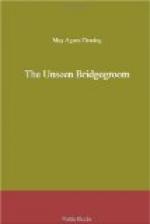Still no reply, still no movement on Mollie’s part. She stood half bowed, her head averted, her face covered by her hands.
“It drove me into a sort of frenzy, the thought of your becoming Sir Roger Trajenna’s wife. If he had been a young man, and you had loved him, I would have bowed my head, as before a shrine, and gone my way and tried to forgive you and wish you happiness. But I knew better. I knew you were selling yourself for an old man’s rank, for an old man’s gold, and I tried to despise and hate you. I tried to think that no base act I could commit would be baser than the marriage you were ready to make. A plan—mad, impracticable as my own mad love, flashed across my brain, and, like many other things impossible in theory, I did it! It seemed an impossiblity to tear you from the very altar, and make you my wife, all unknown, but I did it. I had this house here, uninhabited, furnished. I had a friend ready to help me to the death. I disguised myself like a hero of romance, I decoyed you here, forced you to consent, I married you!”
Still mute, still dropping, still averted, still motionless. There was a tremor in Hugh Ingelow’s steady voice when he went on.
“How hard it was for me, what a cruel, cold-blooded monster I felt myself, how my very heart of hearts was touched by your suffering here, I can not tell. Besides, it would seem like mockery, since all my compassion did not make me spare you. But from the moment you set foot here I considered it too late; and then, besides, Mollie, I was mad with love of you. I could not let you go. You yielded—you consented to barter yourself for freedom, as once before you consented for gold. I brought the Reverend Raymond Rashleigh here—he married me under my second name of Ernest—as you know.”
He paused again. Still no sign, and then he went on:
“I let you go. I did not dare reveal myself, but I kept my promise. Hate me, Mollie, as you will; despise me, as you must—but try and think how dearly I love you. I would lay down my life for you, my darling Mollie. That would be an easy sacrifice; it remains for me to make a greater one. A divorce shall set you free. I myself will obtain that divorce. No one knows of our marriage—no one ever shall know. I will leave you free—free as the wind that blows—to go forth and make happy a more honorable and deserving man. Only, Mollie, no man ever will love you as I love you!” His voice failed. He turned abruptly away, and stood as if waiting for her to speak. But she never uttered a word.
He took her silence for a token of her utter scorn and hate.
“Farewell then, Mollie,” he said. “I go, and I will never molest you more. The carriage that brought you here will fetch you home again. But before we part forever, let me say this—if you ever want a friend, and can so far forgive me the wrong I have done you as to call upon me for help, then, Mollie, I will try to repair my unpardonable offense.”




